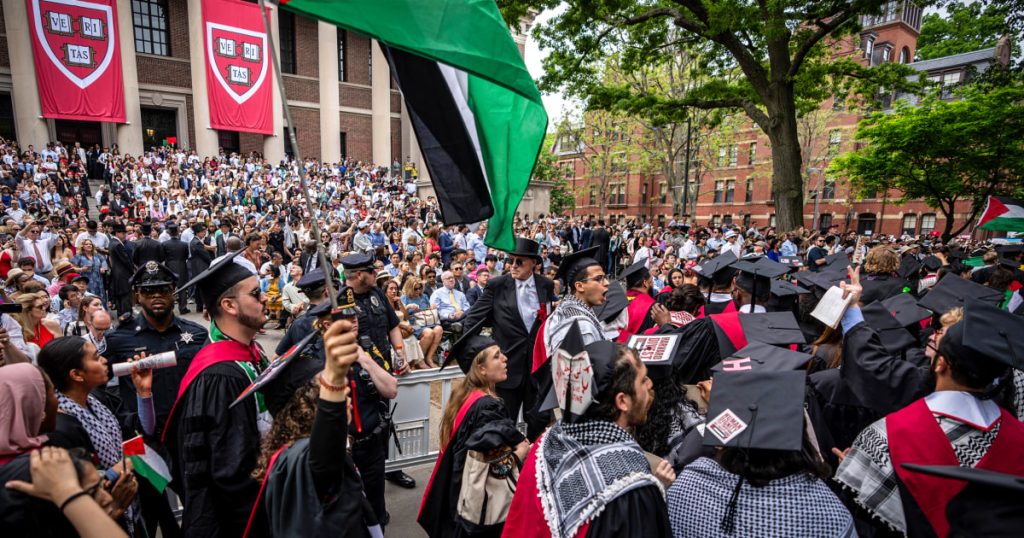Protests against the Israeli-Hamas conflict continued at American colleges like Harvard and UCLA this spring despite the dismantling of encampments on some campuses. At Harvard, 13 students were disqualified from graduation due to their involvement in earlier protests, leading to a walkout during the annual commencement ceremony. The university overruled faculty members who had voted to re-invite the students, causing unrest among some participants at the event. Interim president Alan M. Garber acknowledged the protesters’ right to express themselves during the graduation ceremony, which featured Palestinian flags and chants. Harvard planned to fast-track degrees for excluded students if successful appeals are made.
At UCLA, pro-Palestinian protesters returned to the campus, prompting the LAPD to go on high readiness in anticipation of potential disturbances. Demonstrators gathered at Kerckhoff patio before making a move to takeover nearby Dodd Hall, where a Palestinian flag was displayed from a window. The LAPD staged nearby in riot gear, and warnings were issued to protesters that they face arrest, possible disciplinary action, and a campus ban if they do not disperse. The university had faced criticism for a slow response in dislodging protesters during a previous clash at the campus on April 30.
The protests at both Harvard and UCLA were part of a broader movement at colleges across the U.S. and other countries to denounce civilian deaths and displacement in Gaza during the ongoing Israel-Hamas conflict. Protests called for schools to divest from financial support of Israel, with some campuses setting up encampments as a form of demonstration. The situation escalated at UCLA on April 30 when a mob attacked pro-Palestinian protesters before authorities intervened, leading to the arrest of over 200 people. Investigations were launched into the response of campus and city police during the clash, resulting in the reassignment of UCLA’s chief of police.
The exclusion of 13 students from graduation ceremonies at Harvard due to their protest activities has cast a shadow on what should have been a joyous occasion for many. The institution acknowledged the impact of the disqualifications on students and their families, stating that it aims to confer the excluded degrees if successful appeals are lodged. The university had previously taken steps to engage with protesters on disclosure and divestment issues, and the decision to exclude the students from graduation had caused discontent among the Harvard community. The ongoing protests highlight the deep-seated emotions and complexities surrounding the Israeli-Palestinian conflict.
At UCLA, efforts to prevent the re-establishment of an encampment on campus reflect a stance of zero tolerance for such activities. The university has warned protesters of potential consequences if they do not disperse, emphasizing the need to maintain a safe and orderly campus environment. The events at Harvard and UCLA underscore the charged atmosphere that surrounds discussions on the Israeli-Palestinian conflict, as well as the importance of ensuring that protests are carried out in a peaceful and lawful manner. As universities navigate these complex issues, they must balance the principles of free speech and expression with maintaining a supportive and inclusive environment for all members of the community.













